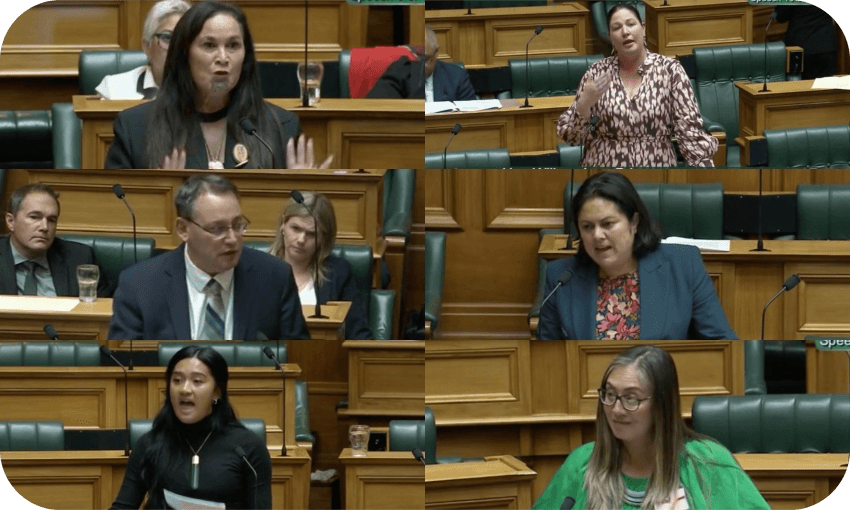As the government attempted to rush through a bill to scrap Te Aka Whai Ora before an urgent Waitangi Tribunal inquiry into the proposal could take place, opposition MPs hit out at health minister Shane Reti.
The government has followed through on a key pillar of its 100-day plan, introducing legislation to dismantle Te Aka Whai Ora under urgency last night, before a scheduled Waitangi Tribunal hearing into the proposal was able to take place.
Following an afternoon and evening of heated and at times emotional debate, the house adjourned at 10pm last night with the Pae Ora (Disestablishment of Māori Health Authority) Amendment Bill having passed its first two readings. Debate will continue this morning when the house resumes at 9am, as the bill has its third reading and is expected to be passed into law.
The Waitangi Tribunal had granted claimants Lady Tureiti Moxon and Janice Kuka an urgent hearing to determine whether the proposed dismantling of Te Aka Whai Ora breached the principles of the Treaty of Waitangi, which was scheduled to begin tomorrow, on Thursday February 29. The introduction of the bill means the tribunal has lost jurisdiction over the claim. Its inquiry can go ahead once the bill passes into law, but this will be too late for any recommendations that might change the government’s course of action (as unlikely as that would have been).
The significance of the timing of the bill – introduced on the same day as a bill to repeal planned smokefree laws – was not lost on opposition MPs in the parliamentary debating chamber.
“How can he [the prime minister] justify dismantling the Māori Health Authority in the same week as repealing smokefree legislation when Māori die seven years earlier, on average, than non-Māori and smoking is our leading cause of premature death?” asked Te Pāti Māori co-leader Debbie Ngarewa-Packer in question time.
“Does he consider a government’s use of urgency to progress a political agenda without public scrutiny to be an abuse of the democratic process?” she asked next.
(The answers to the above were, to paraphrase, smoking rates were already going down and no).
Introducing the bill, Shane Reti, the minister of health, said, “While the particular version of the dream that the Māori Health Authority laid out is coming to an end today, I want to paint a different dream, one that will be outcomes driven, providing greater devolved decision-making that will deliver care as close to the home and the hapū as possible,” he said.
“There is organisational expertise in the Māori Health Authority, and I want to retain that. I say to Māori Health Authority staff to please join me, guide me, and help us together to row a different waka towards better health outcomes. This bill enables that.”
As the bill was debated, Debbie Ngarewa-Packer, said Māori were clearly seen as “expendable” to the current government. “And the politicking that is going on before the very nation of Aotearoa – and the world – is that you have determined that you know better what Māori want,” she continued.
“From day one you have carried on the kōrero that this is a two-tier system based on race… Well, excuse us. Excuse us for having to have a separate need to be able to have our wellbeing addressed, because we are dying earlier than everyone else.”
Green MP Hūhana Lyndon described the removal of Te Aka Whai Ora as the “recolonisation of hauora Māori” in New Zealand. “There is a strong feeling in our kāinga and within iwi that we’ve been ripped off by this government. Disestablishing Te Aka Whai Ora now… we’ve never got a chance to see the waka grow and reach its full potential. Te iwi Māori are ripped off,” she said.
Labour’s Willow-Jean Prime, speaking entirely in te reo, was visibly emotional as she spoke directly to Reti – to whom she referred as a whanaunga – for his role in developing the legislation, saying the health of their family was in his hands. Both Prime and Reti affiliate to Ngāpuhi hapū Te Kapotai. Prime said her anger at the government was matched by sadness that one of her relatives was leading the bill in the house and cutting off the Waitangi Tribunal hearing. “Ko taku whanaunga he tangata arero rua,” she said. Arero rua, literally “two-tongued”, means deceitful or two-faced.
Assistant speaker Greg O’Connor, listening to a live translation as Prime spoke, cut in twice to tell Prime that while he only had the translation to go on, it appeared her “personal remarks” were close to being out of line.
Former health minister Ayesha Verrall also directed anger at Reti, calling him “cowardly” for choosing to push the legislation through under urgency rather than face scrutiny from the public and the Waitangi Tribunal. “It is shameful,” she said. “We have heard repeatedly that Dr Reti has a dream for Māori. I don’t see any evidence of a plan, I don’t see evidence of anything that will actually change things. I see evidence of populism, actually.”
Labour’s Arena Williams and Kieran McAnulty called the bill “a huge regression” and “disgraceful” respectively, while first-term MPs Cushla Tangaere-Manuel (Labour) and Hana-Rawhiti Maipi-Clarke (Te Pāti Māori) referenced the Tohunga Suppression Act of 1907, which attempted to stop the use of traditional Māori healing practices.
“Knowing that they are going to replace mātauranga Māori, well, what is the plan?” asked Maipi-Clarke. “What is the strategy? What does that mean, by taking out mātauranga Māori? Is that Tohunga Suppression Act 2.0?” Tangaere-Manuel spoke of her mother, whom she said was treated inadequately because she believed in rongoā Māori. “We can only wonder what would have been if her beliefs were honoured and she was provided mainstream care to go alongside that.”
Parliament will convene at 9am to vote on the third reading of the bill.





